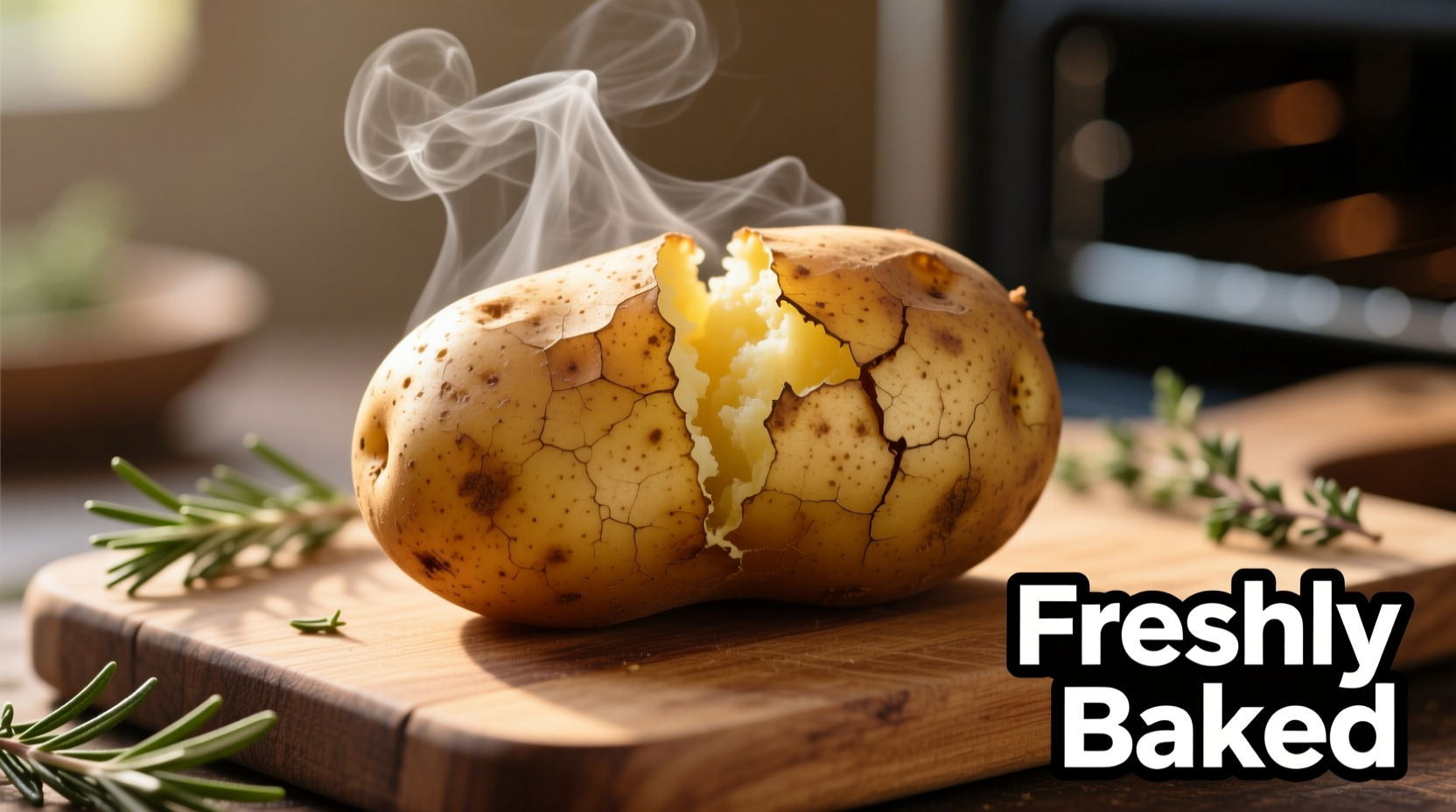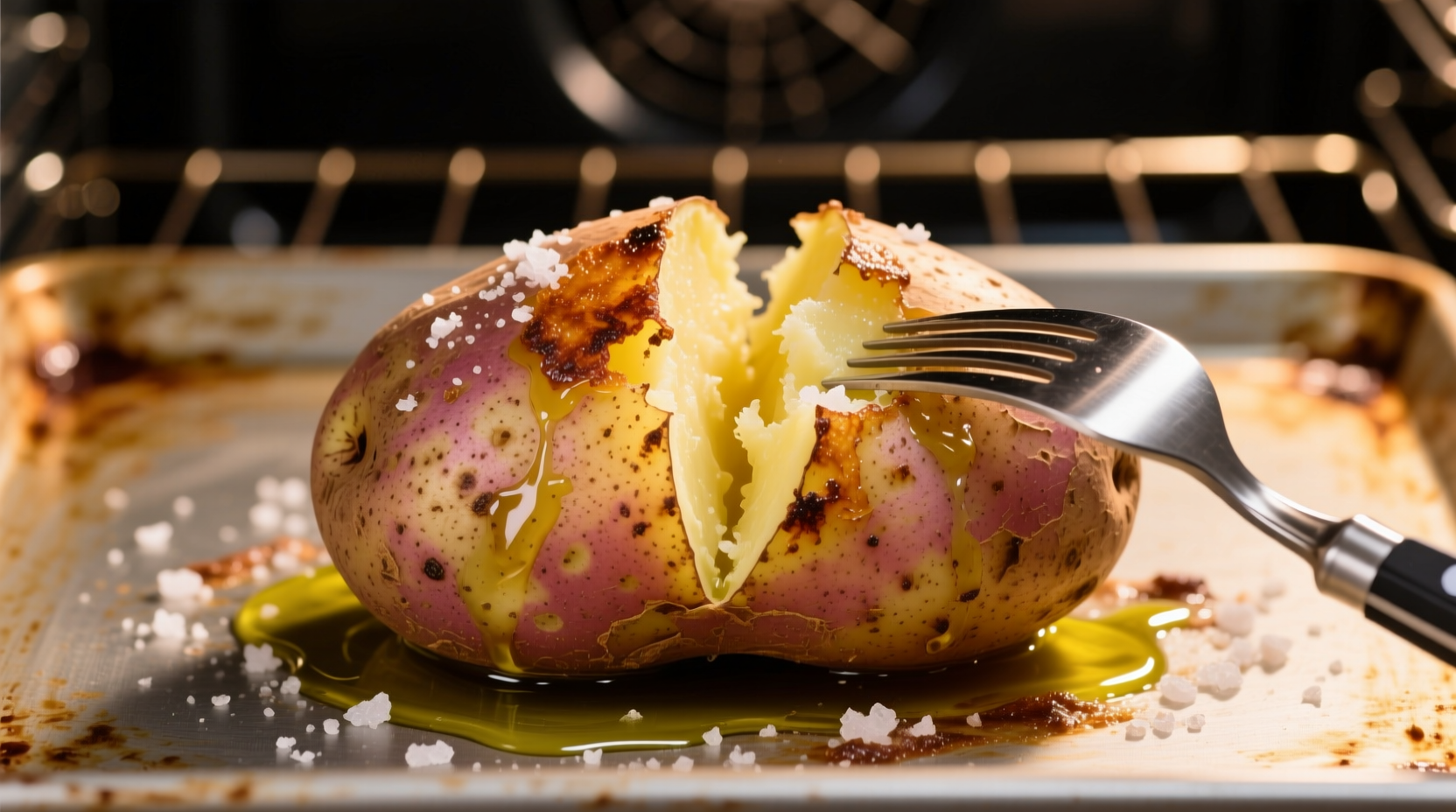Perfectly baked potatoes shouldn't be a guessing game. Whether you're preparing a weeknight dinner or hosting guests, knowing exactly how long to bake a potato at 350 degrees transforms this humble side dish into a restaurant-quality staple. In this guide, you'll discover science-backed timing for every potato size, learn critical food safety temperatures, and master professional techniques that guarantee perfect results every time—no more undercooked centers or dried-out flesh.
The Science of Baking Potatoes at 350°F
Baking at 350°F creates the ideal environment for starch conversion. At this temperature, moisture evaporates slowly enough to prevent cracking while allowing starch granules to fully swell and gelatinize. The USDA Food Safety and Inspection Service confirms that potatoes reach safe eating temperature between 205-210°F, where harmful bacteria are eliminated while maintaining optimal texture (USDA FSIS).
Unlike higher temperatures that can cause rapid moisture loss, 350°F provides controlled heat transfer through the potato's dense structure. This moderate baking temperature works particularly well for larger potatoes that need time for heat to penetrate to the center without overcooking the exterior.
Step-by-Step Baking Process
Preparation essentials: Start with uniform russet potatoes (the classic baking variety), scrubbed clean but not peeled. Prick each potato 4-6 times with a fork to allow steam to escape. For crispier skins, rub with 1 teaspoon of oil and sprinkle with coarse salt before baking.
Optimal placement: Place potatoes directly on the oven rack with a baking sheet on the rack below to catch any drips. This allows hot air to circulate completely around each potato, preventing soggy spots that occur when baking on a solid pan.
| Potato Size | Weight | Baking Time at 350°F | Internal Temp |
|---|---|---|---|
| Small | 5-7 oz (140-200g) | 45-50 minutes | 205-210°F |
| Medium | 8-10 oz (225-280g) | 55-65 minutes | 205-210°F |
| Large | 11-14 oz (310-400g) | 70-80 minutes | 205-210°F |
| Jumbo | 15+ oz (425g+) | 85-95 minutes | 205-210°F |
Testing for Perfect Doneness
Timing alone isn't enough for how long to bake potatoes in oven at 350. Professional chefs use three verification methods:
- Internal temperature: Insert an instant-read thermometer into the thickest part. At 205-210°F (96-99°C), starches have fully gelatinized for that signature fluffy texture.
- Squeeze test: Using oven mitts, gently squeeze the potato. It should yield slightly with no resistance in the center.
- Knife test: A paring knife should slide in with no resistance and come out clean.
According to the University of Minnesota Extension, undercooked potatoes remain dense and waxy because starches haven't fully absorbed moisture (UMN Extension). Overcooked potatoes develop dry, crumbly textures as excessive moisture evaporates.
Factors That Change Baking Time
Several variables affect how long does it take to bake a potato at 350 degrees, requiring adjustments to standard timing:
- Potato variety: Russets need 10-15% longer than Yukon Golds due to higher starch content. Sweet potatoes require similar timing but should reach 200°F instead of 210°F.
- Oven accuracy: Use an independent oven thermometer. Many home ovens vary by 25°F from the set temperature, significantly impacting baking time.
- Starting temperature: Refrigerated potatoes add 10-15 minutes to baking time compared to room temperature potatoes.
- Altitude: Above 3,000 feet, increase baking time by 5-10% as water boils at lower temperatures, slowing starch gelatinization.

Troubleshooting Common Issues
Problem: Potatoes take longer than expected at 350°F
Solution: Verify oven temperature with a separate thermometer. Many ovens run cooler than indicated, especially when first heated. Preheat for at least 20 minutes before baking.
Problem: Soggy skin despite proper internal temperature
Solution: Place potatoes directly on the oven rack instead of a baking sheet. For extra-crisp skin, turn off the oven during the last 10 minutes and leave potatoes inside with the door slightly ajar.
Problem: Undercooked center despite correct timing
Solution: Wrap in foil only after potatoes are nearly done (last 15-20 minutes). Foil traps steam, creating a boiled texture rather than baked. For faster cooking, microwave potatoes for 5 minutes before finishing in the oven.
Professional Serving Techniques
Maximize your perfectly baked potatoes with these chef-approved methods:
- Cut a slit across the top and gently squeeze the base to open naturally without tearing the skin
- Fluff the interior with a fork before adding toppings to create pockets for butter and seasonings
- For restaurant-style presentation, keep baked potatoes warm in a 200°F oven for up to 30 minutes
- Store leftovers in the refrigerator for up to 5 days—reheat in the oven at 350°F for best texture
Understanding how long to bake a potato at 350 in the oven transforms this simple side dish into a culinary highlight. By following these precise timing guidelines and professional techniques, you'll consistently achieve potatoes with light, fluffy interiors and perfectly crisp skins—every single time.











 浙公网安备
33010002000092号
浙公网安备
33010002000092号 浙B2-20120091-4
浙B2-20120091-4